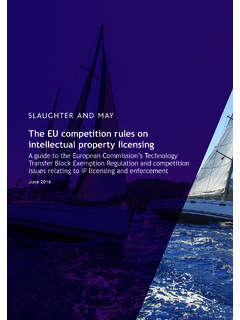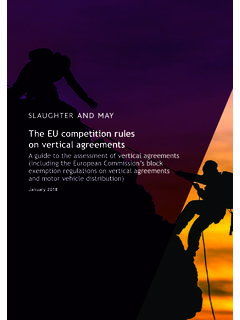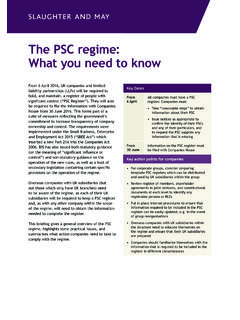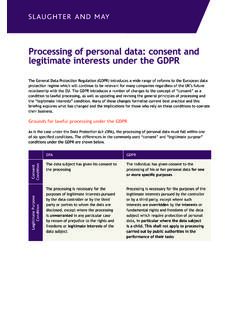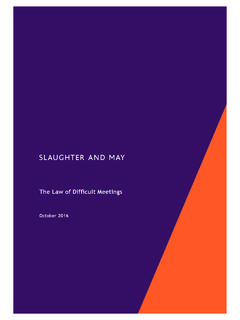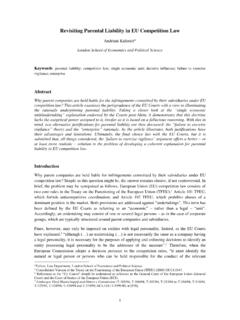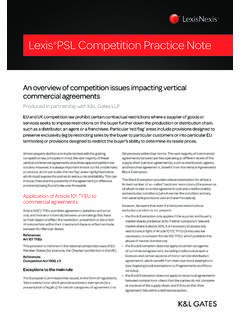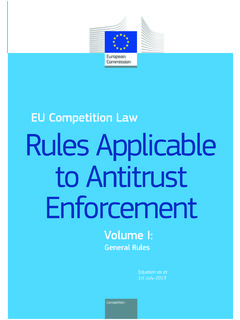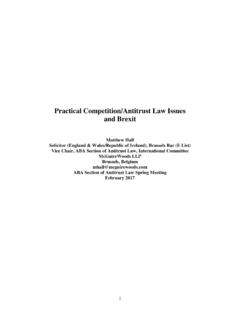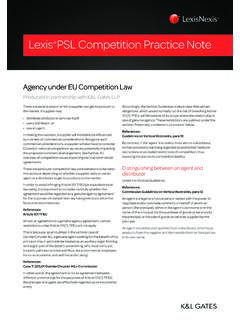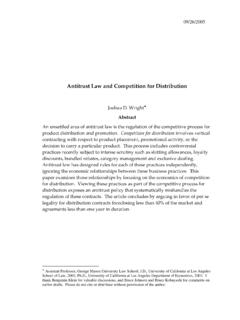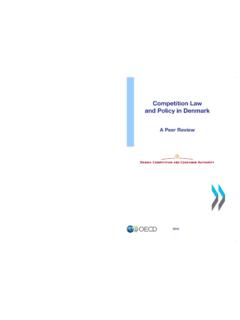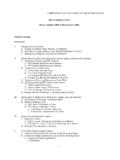Transcription of An overview of the UK competition rules (PDF)
1 An overview of the UK competition rulesJune 2016 / An overview of the UK competition rulesContents1. Introduction 12. Inter-relationship with EU law 33. Anti-competitive agreements (including cartels) 64. The cartel offence 115. Abuse of market power 136. CMA investigation and enforcement 157. Market studies and investigations 291 / An overview of the UK competition rules1. Introduction The UK competition rules can be considered under the following broad agreements and Chapter I of the competition Act 1998 (the competition Act) prohibits any agreement or concerted practice which has the object or effect of preventing, restricting or distorting competition unless an exemption from the prohibition applies.
2 Where the agreement or concerted practice affects trade between EU Member States, it may also be prohibited by Article 101 of the Treaty on the Functioning of the European Union (TFEU). Companies and individuals found to have breached the Chapter I prohibition are liable to fines of up to a maximum level of 10% of worldwide turnover for companies and disqualification from serving as a director for a period of up to 15 years for Cartels are considered to be the most serious form of anti-competitive agreement. Criminal offences for individuals involved in cartels were introduced in the UK in 2003; participation by an individual in price-fixing, bid-rigging, market sharing or limitation of output or supply may lead to the imposition of a prison sentence of up to five years duration, unlimited fines, or The competition and Markets Authority (CMA)
3 Is primarily responsible for enforcement of the Chapter I prohibition which may also be invoked in private litigation before UK When applying the Chapter I prohibition to an agreement or concerted practice to which Article 101 also applies, neither the CMA nor the UK courts may prohibit the relevant agreement or concerted practice under UK competition law if it would be permitted under Article Immunity from both civil penalties and criminal sanctions may be available to cartel whistleblowers under the CMA leniency of market Chapter II of the competition Act prohibits the abuse of a dominant market position in the UK. Such an abuse may also breach Article 102 TFEU to the extent that it affects trade between Member States. The civil sanctions for breach of the Chapter II prohibition are the same as those that apply to breach of the Chapter I prohibition and it can be enforced by the CMA or private litigants in the same way.
4 There are no criminal sanctions for purely unilateral conduct which is deemed to constitute an abuse of market The CMA is primarily responsible for enforcement of the Chapter II prohibition which may also be invoked in litigation before UK courts. In contrast to the position in relation to Article 101, the CMA and UK courts are permitted to apply UK competition law relating to abusive conduct that is stricter than Article On 1 April 2014, the CMA became the UK s national competition enforcement agency taking over the competition functions previously performed by the Office of Fair Trading (OFT) and competition Commission (CC).2 Applications for leniency and no-action in cartel cases (July 2013, OFT 1495), adopted by the An overview of the UK competition rules / Market The CMA has wide powers under the Enterprise Act 2002 to investigate markets where there are concerns that competition may not be operating effectively, including by reason of the structure of the relevant market.
5 In the event of an adverse report, a wide range of remedial steps may be taken, including the unwinding of agreements, the imposition of price controls to specific markets and the introduction of other statutory-based UK merger control provisions are contained in the Enterprise Act. They are considered in a separate Slaughter and May publication UK Merger Control under the Enterprise Act 2002. They apply to mergers which do not fall within the exclusive competence of the European Commission under the EU Merger Regulation (see the separate Slaughter and May publication The EU Merger Regulation).3 / An overview of the UK competition rules2. Inter-relationship with EU EU competition law is of critical importance to the interpretation and application of the UK competition The competition Act prohibitions are modelled upon those contained in Articles 101 and 102 TFEU.
6 To minimise divergence between the application of the respective prohibitions, Section 60 of the competition Act incorporates into UK law: a governing principle that UK law should not diverge in its substantive application from EU law; an obligation on national courts and tribunals to ensure consistency of interpretation between the competition Act, TFEU and established and future jurisprudence of the European courts; and a general duty to have regard in determining any matter to any relevant decision or statement of the European Section 60 applies whether or not the relevant agreement or conduct affects trade between Member States. In cases where there is an effect on inter-state trade, the obligation to observe consistency with EU law is reinforced by the Modernisation Regulation (see below).
7 The governing The governing principle requires that every substantive provision of the competition Act must be interpreted against the background of established EU law, and against the need to ensure a harmonious interpretation between the competition Act and EU competition However, harmonious interpretation need be achieved only in so far as is possible (having regard to any relevant differences between the provisions concerned) . This opt-out is significant in a number of respects: The competition Act confers a greater degree of legal professional privilege against production of documents than exists under EU law and is specifically designed to override the EU position and to extend legal professional privilege to documents produced by in-house counsel.
8 A key difference between the EU rules and the competition Act is that, under the competition Act, there is no requirement of an effect on trade between Member States. Furthermore the goal of consistent interpretation applies in relation to competition . This begs the question whether the governing principle clause should apply, for example, to procedural matters, or to the general principles of law recognised by the European courts. It is now accepted that Section 60 imports the high-level principles as basic procedural safeguards, as well as the specific case law on Articles 101 and Examples of high-level principles are equality, legal certainty, legitimate expectations, proportionality and privilege against Napp Pharmaceutical Holdings Ltd v DGFT [2001] CAT An overview of the UK competition rules / Consistency of The competition Act imposes a positive obligation on national courts and tribunals (including the CMA)
9 When determining a question under the competition Act to ensure that there is no inconsistency between their decision and the relevant principles and decisions of the European Furthermore Article 267 TFEU allows national courts to request preliminary rulings from the Court of Justice of the European Union (CJEU) on matters of EU law. In relation to particularly difficult cases involving the interpretation of the competition Act prohibitions on which there is no existing authority at the EU level, the UK government is of the view that a reference to the CJEU under Article 267 TFEU is open to the CMA. The CJEU has itself confirmed that it does have jurisdiction to rule on the interpretation of national law in appropriate cases in so far as the national law directly incorporates or mirrors provisions of EU Statements of the European As well as being guided by the European courts, the UK courts are required in addition to have regard to any relevant decision or statement of the Commission.
10 A number of points should be noted in relation to this: first, unlike the obligation in relation to court decisions, there is no absolute obligation on UK courts and tribunals to ensure consistency between national decisions and decisions or statements of the Commission. Rather, these will be of persuasive authority only;5 secondly, the competition Act is silent in relation to statements by European institutions other than the Commission. A national court could, nonetheless, clearly have regard to minutes of Council meetings or reports of Parliamentary debates if it considered these of relevance to the case at hand; and thirdly, the reference to statements of the Commission encompasses, for example, Notices on Interpretation, competition Policy Reports, Guidance (including that on enforcement priorities)6 Bulletins and even Press Modernisation The Modernisation Regulation was the cornerstone of a move to re-orientate enforcement of EU competition rules away from the Commission towards the Member States and to minimise conflicts between national and EU competition rules .
